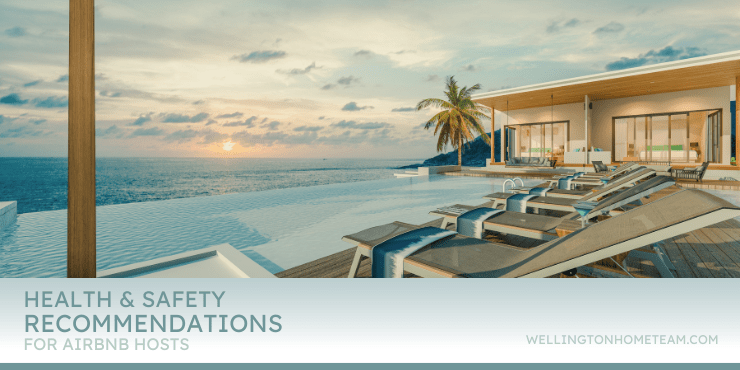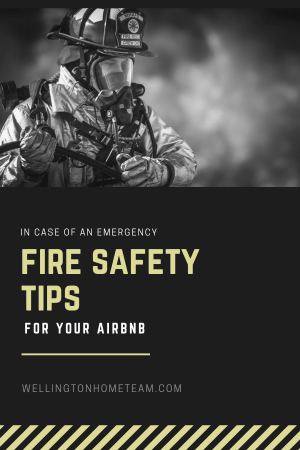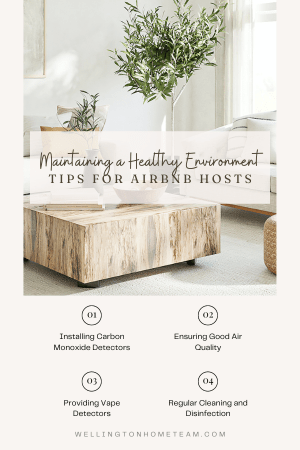Health and Safety Recommendations for Airbnb Hosts
Since its inception in 2007, Airbnb has grown to become one of the most popular ways to offer Vacation rentals. For many property owners this is good news, as the emergence of the platform has enabled a new way to capitalize on their investment.

However, there is no such thing as a free lunch, and despite the convenience that the Airbnb platform offers for sharing or renting your property, there are distinct challenges. Perhaps, the most critical of these is ensuring that their guests’ stay is safe and secure.
This guide examines the health and safety considerations for Airbnb hosts. It offers practical advice on how to ensure your guests’ vacation is memorable for all the right reasons.
Understanding Legal & Regulatory Responsibilities
The rise of Airbnb has fundamentally changed the vacation and rental market, initially surprising regulators with its rapid growth. However, the regulatory environment has since evolved, and most states now have clear guidelines and regulations for short-term rentals. As an Airbnb host, understanding and adhering to these legal and regulatory responsibilities is the first step in ensuring a safe and compliant rental experience.
- Obtaining Necessary Permits & Licenses:
Ensure that your property is equipped with the required short-term rental permits and business licenses. These are often issued by local municipalities or state authorities and are a must for legally operating an Airbnb. The requirements can vary significantly depending on your location, so it’s crucial to consult with local officials or a legal advisor to ensure compliance. - Adhering to Zoning Laws:
Zoning laws dictate what types of activities can take place in specific areas. Verify that your property is zoned for short-term rentals and complies with all local zoning regulations. Some areas may have restrictions on the number of days a property can be rented out or may prohibit short-term rentals altogether in certain zones especially if the home belongs to an HOA. - Paying Taxes:
Airbnb income is subject to various taxes, including local occupancy taxes (often referred to as “hotel taxes”) and income taxes. It’s important to be aware of and comply with these tax obligations. In some cases, Airbnb may automatically collect and remit local taxes on your behalf, but this varies by location. Consult a tax professional to understand your specific obligations. - Understanding Insurance Requirements:
Standard homeowner’s insurance policies often do not cover short-term rental activities. To protect yourself against potential liabilities specific to Airbnb hosting, it’s important to secure appropriate insurance coverage. This may include short-term rental insurance or endorsements that cover guest injuries, property damage, and other risks associated with hosting.
Making sure that your property meets these legal and regulatory requirements not only protects you from potential fines and legal disputes but also contributes to a safe and positive experience for your guests.
Ensuring Fire Safety
Fire safety is something that Airbnb hosts must consider as a matter of priority when it comes to health and safety. Minimizing the risk and ensuring that guests know what to do should the worst happen are the key areas to focus on. A common sense approach to fire safety only requires implementing a few safety measures, including:
 Installing Smoke Detectors:
Installing Smoke Detectors:
Place smoke detectors in every bedroom, hallway, and common area, and regularly test them to ensure they are functioning properly.- Providing Fire Extinguishers:
Ensure fire extinguishers are easily accessible in key areas like the kitchen and near exits. Make sure they are regularly serviced and guests know how to use them. - Creating Clear Evacuation Routes:
Post visible instructions for evacuation routes and emergency exits, including a map if necessary. Ensure pathways are always unobstructed. - Minimizing Fire Hazards:
Regularly inspect the property for potential fire hazards, such as faulty wiring, flammable materials near heat sources, or blocked exits.
While the risk of fire can never be entirely negated, implementing a few safety measures can go a long way to ensuring the safety of anyone residing in the property.
Check out these important health and safety recommendations for Airbnb hosts to keep guests happy and secure. #airbnb #vacationrental
Securing the Property
Securing the property is essential for ensuring the health and safety of both you and your guests. By implementing security measures, you can protect against potential risks, prevent unauthorized access, and create a welcoming environment for all who stay at your rental. Here are some key strategies for securing your property effectively:
- Quality Locks:
Ensure that all doors and windows have quality locks. Consider installing deadbolts for added security. - Keyless Entry:
Consider a keyless entry system, which allows you to change access codes between guests. This reduces the risk of lost keys or unauthorized access. - Security Cameras:
Install security cameras at entrances and other strategic locations outside the property. Ensure cameras are visible to deter potential intruders while respecting guest privacy by not placing them in private areas. - Window Security:
Ensure all windows are equipped with secure locks, particularly in ground-level rooms. Consider using window sensors or bars for added protection. - Outdoor Lighting:
Well-lit entrances deter potential intruders. Install motion-sensor lights around the property to enhance security.
The security of any property is a prerequisite, however, with the addition of guests, the stakes are always going to be raised.
Maintaining a Healthy Environment
Maintaining a healthy environment is also a must to ensure that your Airbnb guests enjoy a comfortable and safe stay. Bad reviews on Airbnb or any other forum can have serious ramifications for the reputation of your business and can negatively impact bookings. From air quality to cleanliness, there are several factors to consider that can impact your guests’ health and well-being. Implementing the following measures will help create a safe and welcoming atmosphere:
 Installing Carbon Monoxide Detectors
Installing Carbon Monoxide Detectors
Place carbon monoxide detectors in key areas, especially near bedrooms and fuel-burning appliances, to protect guests from this silent, deadly gas. Regularly check and maintain these devices.- Ensuring Good Air Quality
Keep your property well-ventilated by using air purifiers and ensuring regular maintenance of HVAC systems. Avoid using harsh chemicals for cleaning, which can contribute to poor indoor air quality. - Providing Vape Detectors
Consider installing vape detectors to prevent guests from vaping indoors, which can negatively affect air quality. This not only helps maintain a smoke-free environment but also ensures compliance with no-smoking policies. - Regular Cleaning and Disinfection
Clean the property thoroughly between guests, paying special attention to high-touch surfaces. Provide guests with basic cleaning supplies to maintain hygiene during their stay.
By focusing on these aspects, you can create a healthy environment that enhances guest comfort and safety, leading to better reviews and repeat bookings.
Safety Considerations for Outdoor Areas
Part of the holiday experience is spending a little time just chilling outdoors and maybe just soaking up a few rays. Swimming pools, BBQ areas, and balconies are all well-sought-after features in Airbnb rentals. They do come with their own set of safety considerations though. Here are some of the key health and safety considerations for outdoor areas:
- Securing Pool Areas:
Install a fence around the pool with a self-latching gate and provide clear signage about pool rules. Consider adding a pool cover for added safety when the area is not in use. - Ensuring Balcony Safety:
Check that balcony railings are sturdy and at an appropriate height. Regularly inspect for any damage or wear and tear that could compromise safety. - Maintaining Pathways and Steps:
Keep outdoor pathways, steps, and walkways well-lit and free from obstacles. Repair any cracks or uneven surfaces that could cause trips or falls. Additionally, if you don’t stay onsite, consider a low-maintenance garden to ensure that the cost of keeping it safe doesn’t soar. - Providing Outdoor Lighting:
Install adequate lighting in outdoor areas, especially around pathways, entryways, and any stairs, to ensure safe movement at night.
Safety considerations for Airbnb hosts don’t stop at the door, the safety of the garden and any other outdoor amenities should always be included in your health and safety policies.
Final Thoughts
To some extent, the emergence of platforms like Airbnb has democratized vacation rentals. It is now possible for anyone with an idle property or even just a spare room to offer a place to stay.
However, it can’t be overemphasized just how important ensuring the safety of your guests is when renting out a property on Airbnb. By taking the time to implement the health and safety measures discussed in this guide, you can protect your property, enhance your guests’ experience, and build a positive reputation that leads to repeat bookings and those all-important glowing reviews.
Please consider spreading the word and sharing; Health and Safety Recommendations for Airbnb Hosts
Health and Safety Recommendations for Airbnb Hosts | Check out these important health and safety recommendations for Airbnb hosts to keep guests happy and secure. #airbnb #vacationrental
About the Author
Top Wellington Realtor, Michelle Gibson, wrote: “Health and Safety Recommendations for Airbnb Hosts”
Michelle has been specializing in residential real estate since 2001 throughout Wellington Florida and the surrounding area. Whether you’re looking to buy, sell or rent she will guide you through the entire real estate transaction. If you’re ready to put Michelle’s knowledge and expertise to work for you call or e-mail her today.
Areas of service include Wellington, Lake Worth, Royal Palm Beach, Boynton Beach, West Palm Beach, Loxahatchee, Greenacres, and more.
